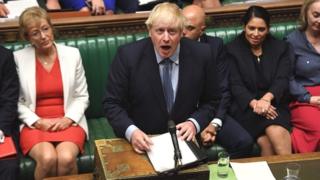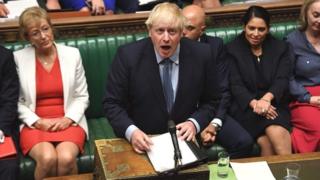Any sign of Parliament calming down in a hurry?
The BBC’s Chris Mason asks when – if – the atmosphere at Westminster will improve. …

 Image copyright Getty Images
Image copyright Getty Images Boris Johnson’s been criticised for language he used in the Commons in a heated debate on Wednesday. So is the atmosphere at Westminster as poisonous and angry as it seems?
You’ve probably heard the phrase “demob happy”.
It expresses a sentiment of rules and conventions being cast aside because what we’ve been long used to is coming to an end.
Well, this feels like a demob-angry parliament. A place that knows the time for procrastination – for now at least – is running short.
And a reckoning is coming very, very soon: on Brexit, and at a general election.
The day after the night before, the place is fizzing.
“I’ve just shopped him to security. I’ve done it three times already today.”
So said an old-timer, referring to Dominic Cummings – the de facto chief of staff to Boris Johnson – standing 20 yards away from us.
He was wandering around chatting to people, but not wearing his security badge.
A man technically in the shadows, but unafraid to be very visible around here. A man whose name is spat out by his political opponents, and revered by some Brexiteers. A man seen as the architect of the government’s strategy since Mr Johnson became prime minister.
After a word from security, his pass hung from his neck.
As shadow chancellor John McDonnell walked past, he merrily shouted: “Hello, comrade.”
Mr Cummings had already had a run-in with another Labour MP, Karl Turner, who had challenged him about what happened in the Commons last night. Mr Cummings had replied that he didn’t know who Mr Turner was.
All of this happened on the floor of Portcullis House, the glass-roofed space full of fig trees and coffee tables. A place where MPs, their staff and journalists mingle and gossip.
One floor up, reporters had already done one of the things we do rather a lot of: loitering.
Because behind two wooden doors, in the Boothroyd Room, Conservative MPs were meeting the prime minister.
‘Reaching out’
Mr Johnson arrived to cheers from some colleagues.
We’re told the European Research Group of MPs – made up primarily of Brexiteers – formed something of a protective ring around the prime minister.
They were the ones making the most noise as Mr Johnson arrived.
Behind them, though, were lots of Tory MPs who didn’t cheer.
The former minister Tobias Ellwood spoke out, saying he was uncomfortable with what had happened on Wednesday night.
Another MP, who is a parliamentary private secretary, the lowest rung of the government ladder, asked the prime minister how he was “reaching out” to MPs, given that in three weeks he might need lots of Labour MPs to vote for a Brexit deal.
One MP whispered that a colleague had told him he would be resigning the whip – no longer sitting as a Conservative MP – because of Wednesday’s rows in the Commons.
The thinking in Downing Street goes like this: they will not shift away from describing the law designed to prevent a no-deal Brexit next month as a “surrender bill”.
The view in No 10 is that the word is an accurate description, as it undermines the ongoing negotiation with Brussels.
Officials also maintain that the best way to improve the atmosphere in Parliament is to deliver Brexit.
And some Conservative sources point out politicians on all sides have been guilty of using the kind of explosive language many would like to see expunged from political debate – such as “tyranny,” “liars” “traitors” and “betrayal”.
But something of a distinction appears to be being drawn between that, and those specific exchanges last night referring to the murdered Labour MP Jo Cox.
Even the most bullish of aides are holding back on that.
The former minister Tim Loughton told Politics Live on BBC Two that during his address to Conservative MPs, Mr Johnson “realised he might’ve not used the best language” on this.
But listen to the language as far as their broader argument is concerned.
“This building taking a wrecking ball to democratic politics is very big potatoes. A lot of people in here don’t want to face the fundamentals of their environment. The last government encouraged people to avoid facing reality, but in the end reality cannot be fooled,” a senior government source said.
“We are trying to get the country out of a hole after the last government drove us into a cul de sac,” the source added, mixing his metaphors but not the message.
The government’s strategy remains as clear as it has been since day one.
The anger in here – on all sides – is very clear too. And it’s not going away.




